Woman Rehomes Her Late Son's Dog Without Informing His Girlfriend, Gets Told Harsh Words
You had hoped to have your dog for at least 12 to 15 years, but circumstances aren't cooperating. Life happens.
Perhaps a member of your family has developed a dog allergy, or you frequently travel for work. It's possible that your dog has behavioral or medical issues that are beyond your capacity to handle.
Finding a new home where your dog will be content and secure is known as "rehoming" a dog. Abandonment and rehoming are not the same thing.
You are doing what is best for your dog by finding it a good home. It's not the same as giving your dog to an animal shelter because you'll be taking him directly from your house to a new one.
When you give your dog to a shelter, it will stay there until a new home is found, either in kennels or foster homes. So, rehoming your dog is the ethical course of action if you are unable to retain him.
This is what the OP in today's story did when her son, who had two dogs, passed away unexpectedly. The OP decided to keep the older one because it requires less care and gave the other to a co-worker who has a soft spot for animals.
The OP's son's girlfriend learned that the dog had been rehomed, and she was upset about it, saying that the OP's son would never approve of this. Read the entire story for yourself below.
Here's The Story's Title

She is young and can walk the puppy and give him the care that he needs to live a happy life
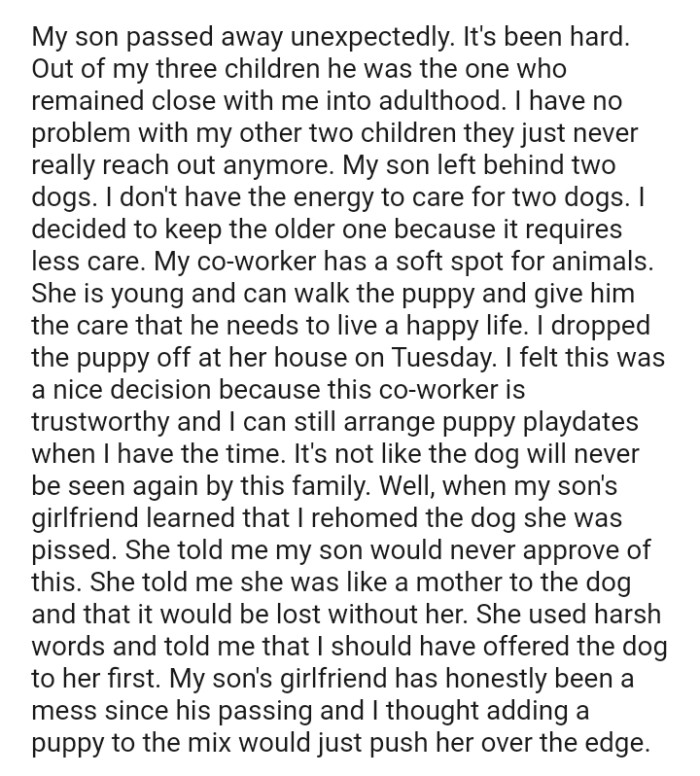
An edit for a more proper understanding
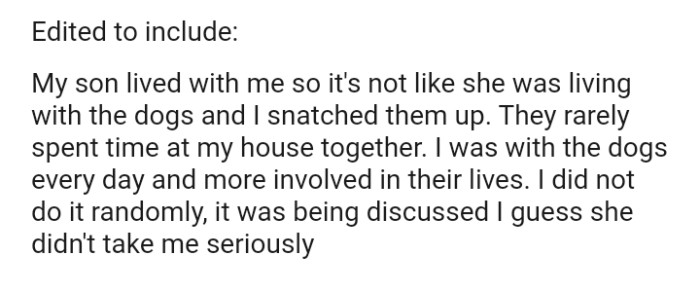
Grief and Attachment
The act of rehoming a pet, especially one that belonged to a deceased loved one, is fraught with emotional complexity. According to research published in the Journal of Loss and Trauma, the grieving process is not only about loss but also about how we manage attachments.
In this case, the woman may have felt overwhelmed by her grief and the responsibility of caring for a pet that constantly reminded her of her late son.
The Emotional Weight of Pet Ownership
Rehoming a pet, especially one tied to a loved one, can be an emotionally charged decision that often leads to conflict.
Research by Dr. Julie K. Kogan at Stanford University highlights the deep emotional bonds people can form with pets, which can complicate decisions about their care.
When those bonds are disregarded, it can lead to profound feelings of betrayal and anger, as seen in this case.
As usual, the comments rolled in and here are some of the most upvoted ones

This Redditor is sorry for the OP's loss

Making responsible arrangements for its care was a good choice
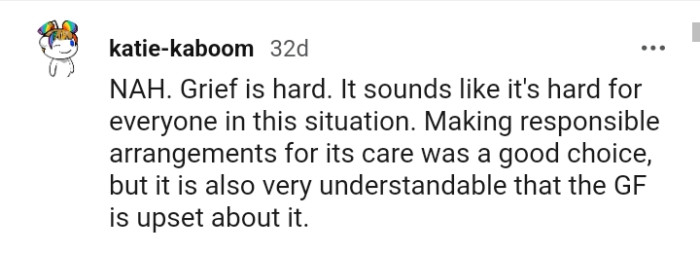
Psychologists point out that attachment theory, developed by John Bowlby, explains how emotional bonds can impact our decision-making processes, particularly in times of stress. The girlfriend's reaction may reflect her own attachment to the dog, viewing it as a living reminder of her relationship with the woman's son.
Psychologists note that decisions made in grief can lead to actions that may not align with the deceased's wishes or the expectations of others.
Studies in bereavement psychology reveal that grief can cloud judgment, making it difficult to navigate relationships and responsibilities.
In this situation, the woman's choice to rehome the dog without consulting the girlfriend may reflect an attempt to cope with her loss rather than a lack of consideration.
You did the responsible thing
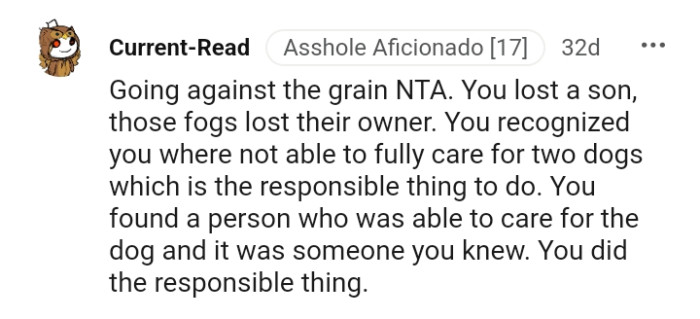
You've said that the dogs belong to your son
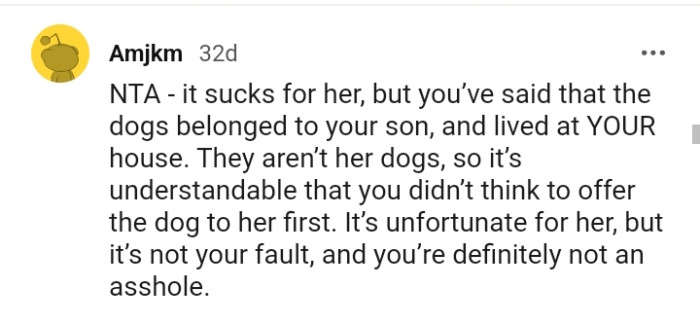
Based on the OP's description of living arrangements

Understanding Emotional Responses to Loss
Reactions to the rehoming of a pet can be intense and multifaceted. Research indicates that emotional responses are often amplified during periods of grief, leading to heightened sensitivity and defensiveness.
The girlfriend's harsh words may stem from her unresolved feelings about the loss and a perceived betrayal in her relationship with the woman.
Understanding the Impact of Grief
Grief can lead to a variety of emotional responses, including anger and confusion, which can complicate interpersonal relationships.
Research published in the Journal of Personality and Social Psychology indicates that unresolved grief often manifests in behavioral patterns that affect decision-making.
In this scenario, the emotional turmoil may have influenced the woman's decision-making process regarding the dog.
You are in a tough place
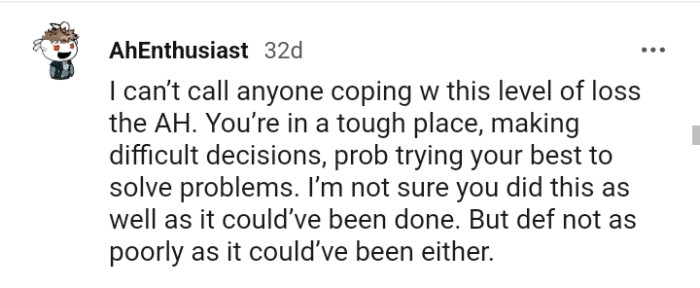
It depends on how close they were
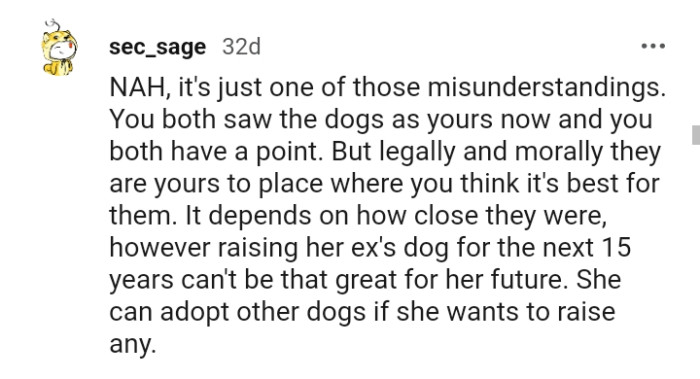
You both must be quite emotional
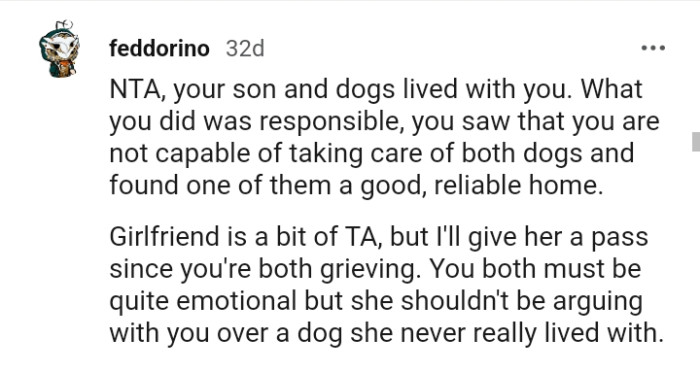
To navigate this emotionally charged landscape, it's essential to foster open communication between the woman and the girlfriend. Psychologists recommend discussing feelings of grief and attachment openly, which can promote understanding and healing.
Creating a safe space for both parties to express their emotions can help facilitate a more compassionate dialogue.
To address these complex feelings, engaging in grief counseling could be beneficial for all parties involved.
Studies show that therapy can provide individuals with the tools needed to process their emotions more effectively and make decisions that honor their loved ones.
Creating a supportive environment for open discussions about grief and responsibilities can also promote healing.
Mom could have reached out to the GF
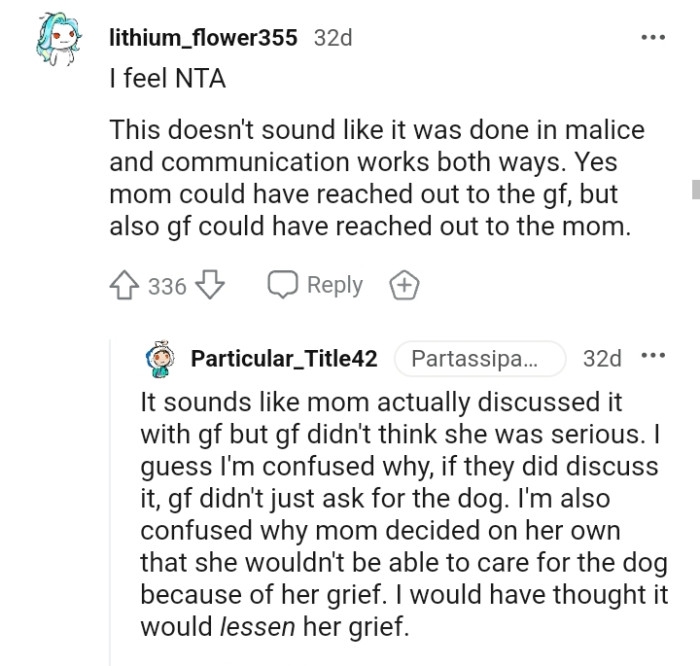
This Redditor's family is currently going through what the OP is experiencing
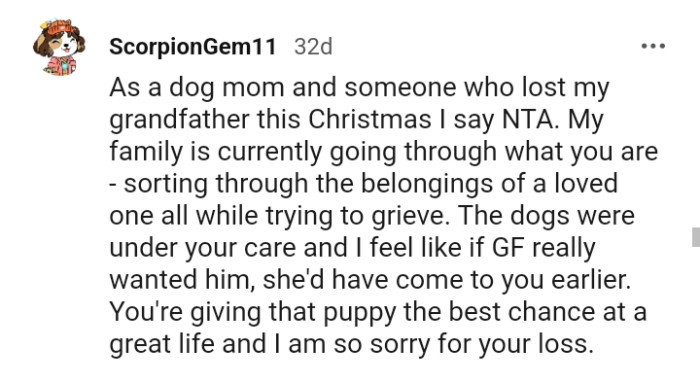
This Redditor would do the same thing the OP did
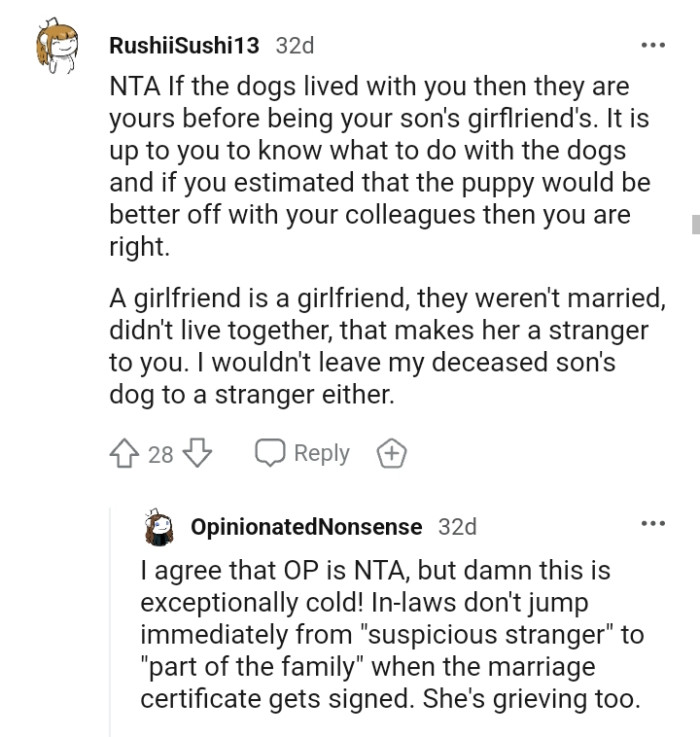
The Role of Empathy in Relationships
Empathy plays a crucial role in resolving conflicts arising from grief and loss. According to Dr. William Doherty, PhD, a family therapist, "Empathetic communication is essential for understanding and healing in relationships." In this scenario, both the woman and the girlfriend would benefit from practicing empathy, recognizing each other's pain associated with the loss and the decisions that followed. Dr. Doherty emphasizes that "acknowledging each other's feelings can pave the way for resolution and connection."
Communication Strategies in Grief
In situations of loss, it's crucial to establish open lines of communication among those affected.
Dr. Michael J. Sullivan, a clinical psychologist, emphasizes that discussing feelings and expectations can prevent misunderstandings.
His research indicates that when individuals feel safe to express their emotions, it leads to healthier relationships and reduces conflict.
The OP was just beginning to view her as an addition to the family
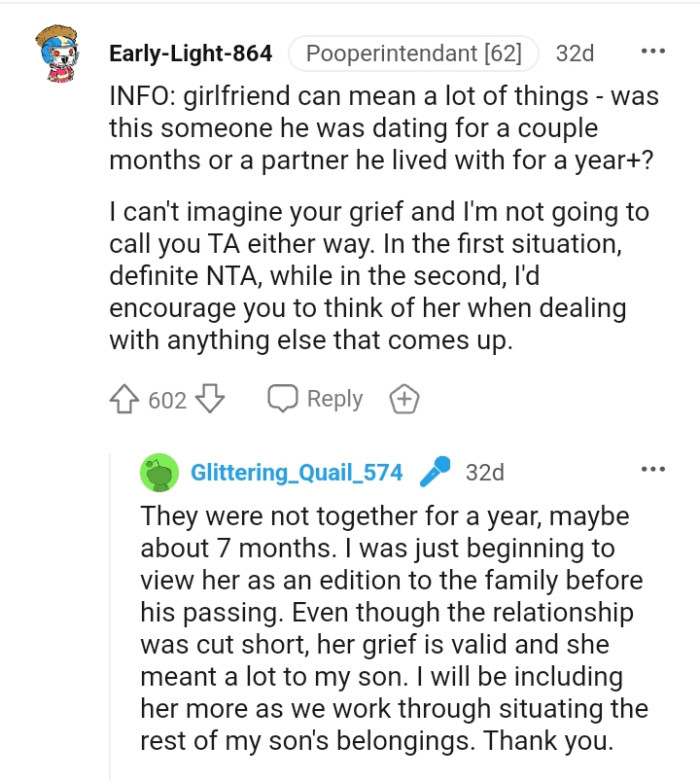
They rarely spent time at the OP's house together
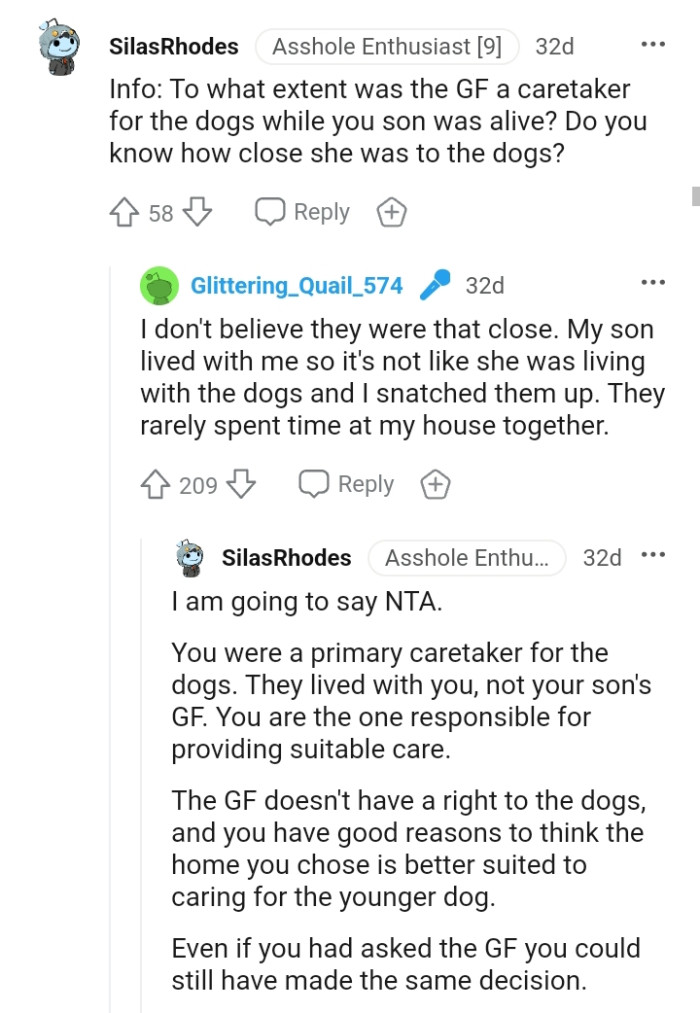
You were with the dogs more than she was

This Redditor can't imagine what the OP is going through
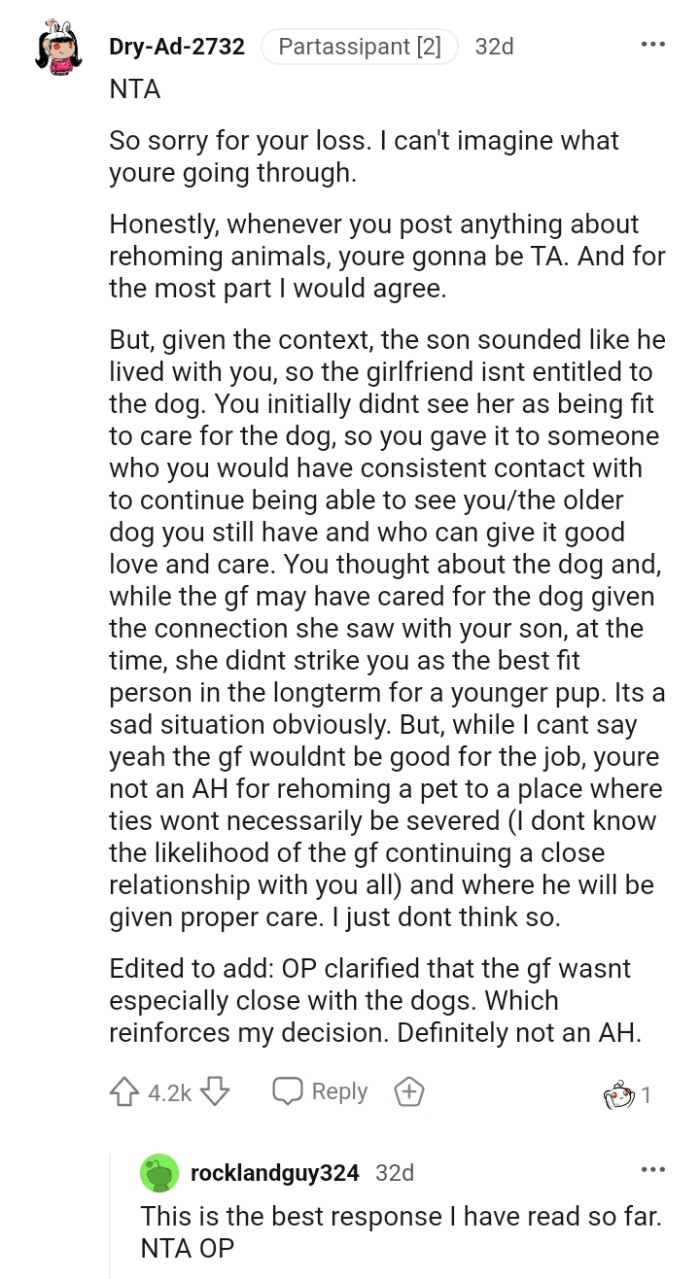
Everyone is just trying to cope with the loss
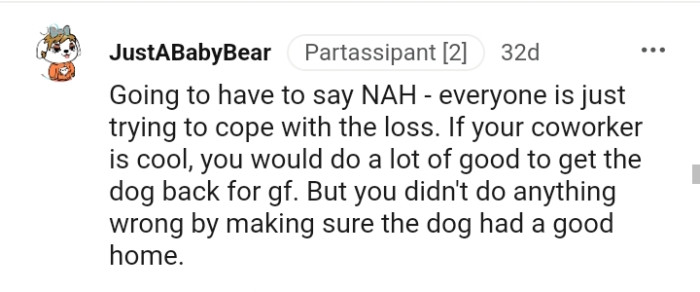
You are making the best decision that you can

The OP's late son and the dogs lived with her
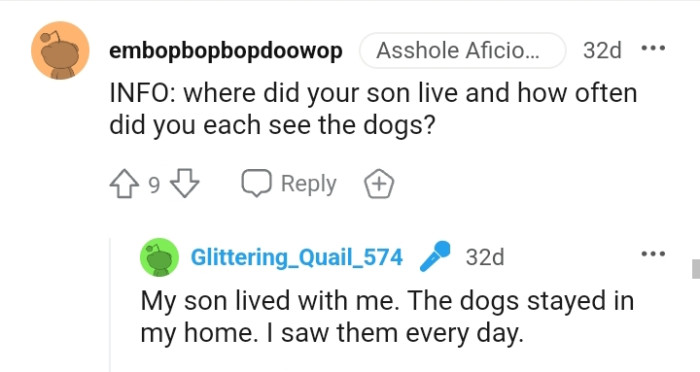
You both loved this person who just passed
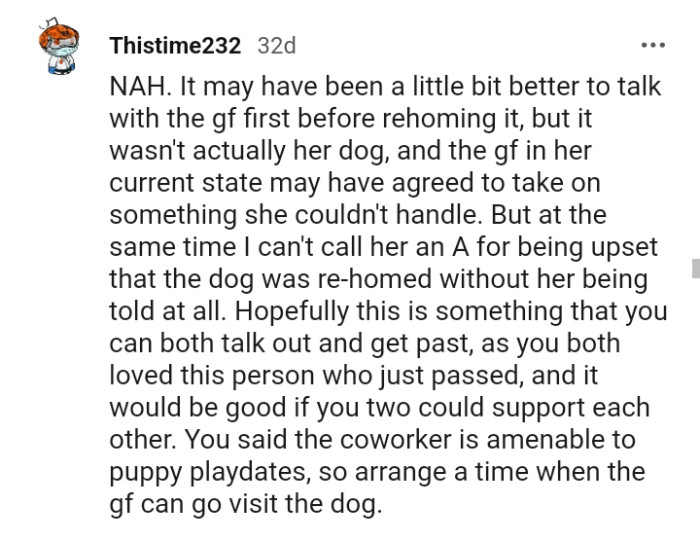
Unfortunately, many shelters are overcrowded, and some dogs never find their perfect family. Making a rehoming decision will be difficult and undoubtedly elicit strong feelings, but it's still better to rehome when you are no longer able to care for him.
At the end of it all, Redditors gave the verdict of "not the AH." Share this post with your loved ones to get their opinions as well.
Psychological Analysis
This situation highlights the difficulties that arise when grief intersects with responsibilities. The emotional weight of a pet connected to a deceased loved one can complicate decisions significantly.
Open dialogue about grief and expectations is essential to navigate these complexities and promote healing among all affected individuals.
Analysis generated by AI
Analysis & Alternative Approaches
Rehoming a pet after the loss of a loved one is a complex emotional issue that requires careful consideration of all parties involved.
Research supports that addressing grief openly can lead to healthier decision-making and interpersonal dynamics.
Ultimately, fostering an environment of understanding and compassion is essential for navigating these challenging circumstances.
Analysis & Alternative Approaches
Ultimately, navigating grief, attachment, and communication is complex, but it is also an opportunity for deep emotional growth. By fostering empathy and open dialogue, both parties can find a path toward healing and mutual understanding.



